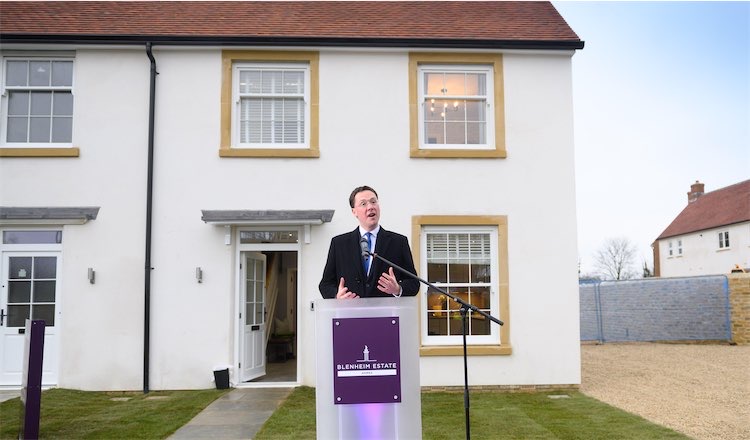Tory MP Says Young People Have "Conservative Values" But Government Must Deliver For Them
Labour had a 43-point lead against the Conservatives amongst voters aged 18-24 in the 2019 general election (Alamy)
5 min read
Conservative MP and former minister Robert Courts has said he believes young people have “overwhelmingly conservative values”, but the government must do more to support the younger generation’s stake in society and the economy.
Courts, who was a transport minister in Boris Johnson’s government between 2020 and 2022, thinks the government should introduce a range of measures aimed at tackling the “growing imbalance” in wealth and assets owned by different generations.
“The values that young people have are, in my experience, overwhelmingly conservative,” he told PoliticsHome.
“There's no doubt that the feeling of freedom, of personal liberty, the ability to spend your own money yourself and benefit from your hard work, which is fundamentally what conservatism is all about, is more prevalent among young people now, in my view, than it’s ever been.
“The thing that's underpinned Conservative support for decades is the fact that people have a stake in society: homeownership, savings and having a little bit to spare. Capitalism seems to have these days become a dirty word, because it's seen as being all about big corporations: that's not what capitalism means. It just means having some capital of your own.”
“Over the past 40 years or so, there's been an increasing imbalance in the political economy, essentially between those who've got assets i.e. those who are older in life, and those who don't i.e. the younger people.”
Arguing that the current taxation and housing systems make it harder than ever before for young people to gain assets, Courts ran through reforms he would like to see in the upcoming Autumn Statement – while recognising there is “only limited fiscal headroom”.
Although he would like to see tax cuts across the board, Courts said that “if we aren't in a position where that can happen”, he would want to see tax cuts targeted towards the young, as at the moment, he felt those who are older “get more of a break”.
“The principle should be that we help out those who need it and I think the need for those who are under 30 in particular is very clear,” he said.
“So we need to find a way to help with that balancing for reasons of generational fairness, but we need to find it in a way that is from a Conservative perspective.”
He proposed cutting the rate of income tax for under-30s, or tapering the personal allowance – the amount of income you do not have to pay tax on – as people get older.
Courts, who is 45 years old, also said the jump of marginal tax rates from 20 per cent to 40 per cent, usually when people hit a salary of more than around £50,000, should be lessened, with more staggering in between.
“That's a huge jump that is likely to come at precisely the point when you're going to find draws on your income, it's exactly that point when you're starting to get headway in your career, starting to become established and then you're starting to look to buy a home or to settle down,” he explained.
“So you could flatten the rate so that instead of getting that jump it could go up incrementally from 20, to 25, to 30 et cetera.”
The Tory MP would also like to see reforms to student loan repayments, as he said that it should be seen as “investing in your education”.
“You are paying into an education so make that tax deductible, or at least proportionately tax deductible, because that takes the burden of having to pay that back off, and it means you're investing in your education,” he said.
If he believes the majority of young people hold conservative values, why does Courts think the Conservative government has not gone far enough in turning these values into delivering beneficial policies for younger generations?
“I do think that we have made extraordinary strides in taking the lowest paid out of taxation altogether and the lowest paid tend to be younger,” he said.
“I think our record is an extremely good one but we need to go further because this is an intergenerational challenge that has only grown more acute.
“I have to accept that I think we need to do more, clearly, otherwise why would I be suggesting these ideas?”
 Robert Courts said the "gap" in the housing market needs to be filled (Alamy)
Robert Courts said the "gap" in the housing market needs to be filled (Alamy)
Courts claimed that across the Conservative Party there was a “growing movement” to lower overall tax burden in a way that would benefit the young, and to also address issues around housing.
“We need to start looking at smaller houses to purchase rather than affordable housing, which tends to be for housing associations,” he said.
“There's absolutely a need for that, but I think the market has become skewed between either affordable housing, which means council housing, or very expensive, big homes, and there's a gap in the middle that we need to tackle.”
Courts recently spoke out in opposition to the development of 1,000 new "affordable" homes in his constituency of Witney in Oxfordshire, telling the Oxford Mail he was "concerned that the infrastructure has not been given proper thought".
The Autumn Statement will take place on 22 November, in which Chancellor Jeremy Hunt will outline the government’s plans for the economy in the coming months, including updates on taxation and spending plans.
Courts appeared doubtful whether his ideas would actually appear in the statement, but insisted that the arguments he and others in the Conservative Party were making “have resonance” with the government.
Other backbench MPs, including Simon Clarke, have continuously pushed Hunt for tax cuts, either in the Autumn Statement or in the Spring Budget next year.
